#DevOps engineer training
Explore tagged Tumblr posts
Text
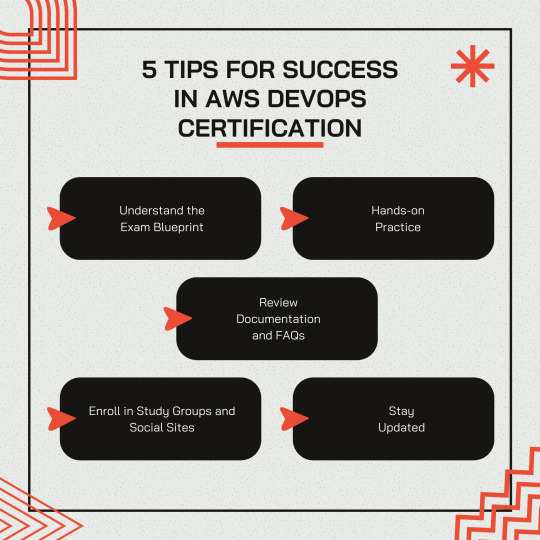
Unlock the power of DevOps in the cloud with our comprehensive AWS DevOps Engineer Certification training course. Designed for professionals seeking to validate their expertise in DevOps practices on the Amazon Web Services (AWS) platform, this course provides a structured learning pathway to help you excel in your career.
0 notes
Text
What is immutable infrastructure in DevOps?
Immutable infrastructure in DevOps refers to an architectural and operational approach where infrastructure components, such as servers, virtual machines, or containers, are created, configured, and deployed in a way that prevents any changes or modifications once they are instantiated. In this paradigm, instead of making direct modifications to existing infrastructure, any desired changes are implemented by creating new instances of infrastructure components with the updated configurations. These new instances are then replaced or added to the environment, while the old instances are decommissioned.
The concept of immutable infrastructure aligns with the principles of automation, consistency, and reproducibility in DevOps practices. By treating infrastructure as code and provisioning it through automated processes, organizations can achieve several benefits. Firstly, the risk of configuration drift and unexpected changes is minimized, as all changes are applied only through the deployment of new instances. This enhances the stability and predictability of the infrastructure environment.
Secondly, immutable infrastructure enables easier rollbacks in case of issues. If a new instance experiences problems, it can be quickly replaced with the previous version, ensuring fast recovery and reducing downtime. This also supports resilience and high availability by allowing the environment to quickly adapt to failures without manual intervention.
Furthermore, immutable infrastructure encourages the use of version control for infrastructure configurations. Infrastructure as Code (IaC) tools like Terraform or Ansible enable teams to define infrastructure configurations in code, enabling versioning, collaboration, and documentation of changes. This promotes consistent practices, transparency, and collaboration among development and operations teams.
Implementing immutable infrastructure requires a shift in how infrastructure is managed. Configuration management tools automate the process of creating and deploying new instances, while continuous integration and continuous deployment (CI/CD) pipelines automate the deployment of applications on top of these instances. This approach aligns well with the DevOps philosophy of automating manual processes and minimizing manual interventions. Apart from it by obtaining DevOps Engineer Course, you can advance your career in DevOps. With this course, you can demonstrate your expertise in Puppet, Nagios, Chef, Docker, and Git Jenkins. It includes training on Linux, Python, Docker, AWS DevOps, many more.
However, adopting immutable infrastructure also presents challenges. Ensuring data persistence, managing stateful applications, and handling updates that require data migration can be complex. Organizations need to carefully design their architecture, implement strategies for data management, and consider compatibility with existing systems.
In summary, immutable infrastructure in DevOps emphasizes creating and managing infrastructure components in a way that prevents modifications once they are instantiated. This approach enhances stability, predictability, and automation, aligning with DevOps principles of automation, consistency, and reproducibility. By treating infrastructure as code and leveraging automation tools, organizations can achieve greater operational efficiency, reduced downtime, and improved resilience in their IT environments.
0 notes
Text
How to Become a DevOps Engineer: A Comprehensive Guide to Developing Your DevOps Career | OpsNexa!
Interested in becoming a DevOps engineer? This thorough guide describes the necessary skills, tools, and steps for a successful career in DevOps. How to Become a DevOps Engineer Learn about programming, cloud computing, automation, and DevOps methods to help you succeed in this in-demand job.
#How-to-Become-a-DevOps-Engineer#DevOps-Career-Guide#DevOps-Engineer-Roadmap#Start-Career-in-DevOps#DevOps-Training-Path
0 notes
Text
DevOps Training Ireland | MotivaLogic Academy
Advance your tech career with DevOps training in Ireland at MotivaLogic Academy. Our practical curriculum is designed to equip you with in-demand DevOps skills including CI/CD, automation, cloud infrastructure, Docker, Kubernetes, and more. Learn from industry experts through real-world projects and gain the confidence to excel in high-paying DevOps roles. Ideal for IT professionals, developers, and system admins looking to upgrade their skills in the evolving DevOps landscape. Join today and get certified with MotivaLogic Academy! Visit now- https://www.motivalogic.com/
0 notes
Text

Fastest Growing IT Roles in India 2025 Edition
Step into the most in-demand tech careers of 2025 with Evision Technoserve! Explore top career paths such as Cloud Administrator, Cybersecurity Analyst, AI & Data Science Engineer, Full Stack Developer, and DevOps Engineer. Gain real-world experience through hands-on projects and learn directly from industry mentors. Evision’s expert-led training programs are designed to fast-track your IT career with 100% placement assistance. Don’t miss out on exciting internship and job opportunities
#fastest growing tech careers 2025 india evision#trending IT jobs for freshers india 2025#future-proof IT careers for students 2025#high demand IT roles with placement india#cloud administrator training with jobs 2025#cybersecurity analyst course with internship#ai & data science engineer course india freshers#devops engineer training with placement india#evisiontechnoserve#internshipprogram
0 notes
Text
Hands-On DevOps Projects: Master Jenkins, Docker, AWS & More
Take your DevOps skills to the next level with real-world projects covering essential tools like Jenkins, Terraform, Docker, Kubernetes, AWS services (EC2, VPC, EKS, Route53, and more). Explore practical deployments like three-tier web applications, e-commerce platforms, WordPress sites, and CI/CD automation using Jenkins and Terraform. Dive deep into cloud services, monitoring with Grafana, and advanced deployment strategies in AWS and EKS. Perfect for DevOps enthusiasts looking to gain hands-on experience in a variety of technologies.
#Real-world projects#de solutions#devops training provider#devops and cloud engineer program#devops interview preparation
1 note
·
View note
Text
#azure data engineer#azure course#azure training#azure online training#azure certification#microsoft azure certification#azure certification path#azure fundamentals#azure devops certification#azure cloud certification#microsoft azure fundamentals
1 note
·
View note
Text
"Why Certified DevOps Developer (CDD) is a Game-Changer for Your Tech Career in 2025"
In the fast-paced world of technology, staying relevant isn’t just an option—it’s a necessity. If you want to thrive in the ever-evolving IT landscape, earning a Certified DevOps Developer (CDD) certification can be your ultimate career accelerator.
The Certified DevOps Developer (CDD) certification is more than just a credential; it’s a testament to your expertise in bridging development and operations for seamless collaboration. As companies increasingly adopt DevOps to boost efficiency and innovation, professionals with a DevOps certification are in high demand. Here’s why earning the CDD is a game-changer for your tech career:
1. Master the DevOps Lifecycle
The CDD certification equips you with a comprehensive understanding of the DevOps lifecycle, including CI/CD pipelines, automated testing, and infrastructure as code. This makes you invaluable in streamlining processes and enhancing software quality, giving you an edge over non-certified peers.
2. Stay Ahead in the Job Market
The demand for certified DevOps professionals is skyrocketing. Employers actively seek candidates with certifications like the DevOps certification course to ensure they have hands-on expertise. With a CDD under your belt, you’ll stand out in a competitive job market.
3. Practical Knowledge Through Hands-On Training
The DevOps training and certification offered through the CDD program emphasizes practical learning. From setting up CI/CD pipelines to managing containerized environments, the skills you gain will make you job-ready from day one.
4. Unlock Lucrative Career Opportunities
Certified DevOps professionals often command higher salaries due to their specialized skill set. Completing the DevOps engineer certification course opens doors to roles like DevOps Engineer, Site Reliability Engineer, and Cloud Engineer—positions that are shaping the future of IT.
5. Adapt to Emerging Technologies
The CDD certification keeps you updated with the latest tools and practices in DevOps. Whether it’s Kubernetes, Docker, or cloud platforms, you’ll be equipped to handle cutting-edge technologies and drive organizational success.
Take the Leap in 2025
With the tech industry evolving rapidly, earning a DevOps engineering certification like CDD is your ticket to staying relevant and competitive. The skills, knowledge, and credibility gained through this certification will position you as a leader in your field.
Start your journey toward becoming a Certified DevOps Developer today. Invest in your future and take the next step toward a fulfilling and dynamic tech career!
For information visit:
Contact : +41444851189
#devops certification#devops certification course#devops training and certification#devops engineer certification course#devops engineering certification
0 notes
Text
AWS DevOps Engineer Certification Training: A Comprehensive Guide to Mastering DevOps
Introduction
In today's fast-paced digital landscape, the integration of development and operations (DevOps) practices has become paramount for organizations striving to achieve agility, efficiency, and reliability in their software development lifecycle. Among the various cloud platforms available, Amazon Web Services (AWS) stands out as a leader in providing robust DevOps solutions. If you're looking to advance your career in DevOps and validate your skills, pursuing an AWS DevOps Engineer certification training course could be your next step towards success.
Understanding AWS DevOps Certification
The AWS DevOps Engineer certification is designed for professionals who possess advanced technical skills and experience in provisioning, operating, and managing distributed application systems on the AWS platform. This certification validates your expertise in implementing DevOps practices and tools in the AWS environment, ensuring seamless integration between development and operations teams.
Why Pursue DevOps Certification?
Career Advancement Opportunities:
Earning an AWS DevOps certification opens doors to a wide range of career opportunities. DevOps engineers are in high demand as organizations increasingly prioritize agility, automation, and collaboration in their software development processes. With this certification, you demonstrate your proficiency in leveraging AWS services to streamline development workflows, optimize infrastructure, and enhance deployment practices, making you a valuable asset to any organization.
Mastery of DevOps Tools and Practices:
The AWS DevOps Engineer certification training equips you with in-depth knowledge of various DevOps tools and practices essential for modern software development. From continuous integration and continuous deployment (CI/CD) pipelines to infrastructure as code (IaC) and monitoring solutions, you'll gain hands-on experience with industry-leading tools like AWS CodePipeline, AWS CodeDeploy, AWS CloudFormation, and AWS CloudWatch. By mastering these tools, you'll be well-prepared to architect scalable, reliable, and automated DevOps solutions on AWS.
Validation of Skills:
Certification serves as tangible proof of your expertise and commitment to excellence in DevOps. By passing the rigorous AWS DevOps Engineer exam, you demonstrate your proficiency in designing, implementing, and managing DevOps practices on AWS. This validation not only boosts your confidence but also enhances your credibility in the eyes of employers, clients, and peers, opening up new avenues for career growth and advancement.
Overview of AWS DevOps Engineer Certification Training Course
Core Concepts Covered:
The AWS DevOps Engineer certification training course encompasses a comprehensive curriculum designed to cover the core concepts and skills required for success in DevOps roles. Key topics include:
AWS services for DevOps: Explore a wide range of AWS services, including compute, storage, networking, databases, and monitoring, and learn how to leverage them to build resilient and scalable DevOps solutions.
Continuous Integration and Continuous Deployment (CI/CD): Understand the principles of CI/CD and learn how to implement automated build, test, and deployment pipelines using AWS CodePipeline, AWS CodeBuild, and AWS CodeDeploy.
Infrastructure as Code (IaC): Discover the benefits of managing infrastructure as code and master tools like AWS CloudFormation to provision and manage AWS resources using declarative templates.
Monitoring and Logging: Learn how to monitor the health and performance of your AWS infrastructure and applications using AWS CloudWatch, AWS X-Ray, and other monitoring tools.
Security and Compliance: Explore best practices for securing your AWS environment and ensuring compliance with industry standards and regulations, including IAM policies, encryption, and auditing.
Hands-on Labs and Projects:
The certification training course includes hands-on labs, exercises, and real-world projects designed to reinforce your learning and practical skills. Through guided exercises and projects, you'll have the opportunity to apply theoretical concepts to real-world scenarios, gaining valuable experience in designing, implementing, and troubleshooting DevOps solutions on AWS.
Expert Guidance and Support:
Throughout the training course, you'll receive expert guidance and support from certified AWS instructors with extensive industry experience. Whether you have questions about course material, need assistance with lab exercises, or require clarification on certification exam topics, our instructors are here to help you succeed.
Tips for Success in AWS DevOps Certification
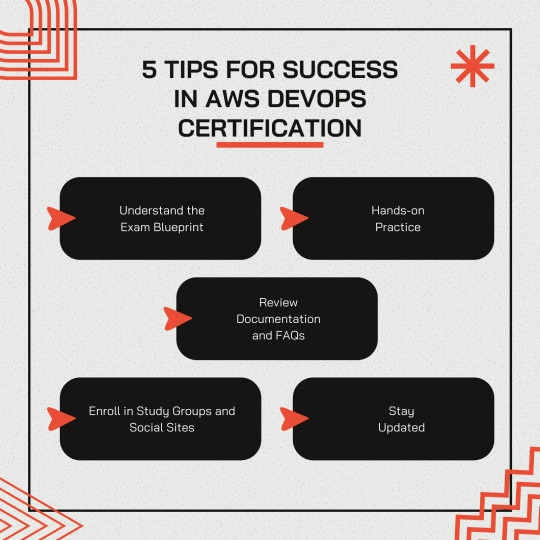
1. Understand the Exam Blueprint:
Familiarize yourself with the AWS DevOps Engineer certification exam blueprint, which outlines the topics and skills covered in the exam. Focus your study efforts on mastering these key areas to ensure you're well-prepared for the exam.
2. Hands-on Practice:
Practice, practice, practice! Hands-on experience is essential for success in DevOps roles and certification exams. Take advantage of the lab exercises and projects included in the training course to gain practical experience with AWS services and tools.
3. Review Documentation and FAQs:
AWS offers comprehensive documentation and FAQs for all its services. Make use of these resources to deepen your understanding of AWS services, explore best practices, and clarify any concepts or topics you find challenging.
4. Enroll in Study Groups and Social Sites:
Join discussion boards, study groups, and online communities devoted to obtaining an AWS DevOps certification to become involved with the AWS community. Collaborating with peers, exchanging ideas, and sharing knowledge can all improve your learning process and offer insightful new viewpoints.
5. Stay Updated:
The field of DevOps is constantly evolving, with new tools, practices, and technologies emerging regularly. Stay updated with the latest trends, developments, and updates in the DevOps ecosystem to ensure your skills remain relevant and in-demand.
Conclusion:
The AWS DevOps Engineer certification training course offers a structured pathway for professionals looking to advance their careers in DevOps. By mastering key concepts, tools, and practices on the AWS platform, you'll not only validate your skills but also gain the expertise needed to architect, deploy, and manage scalable and reliable DevOps solutions in the cloud. Whether you're a seasoned DevOps practitioner or a newcomer to the field, investing in AWS DevOps certification can be a transformative step towards achieving your career goals and unlocking new opportunities in the dynamic world of cloud computing.
0 notes
Text
Jira Change and Incident Management Implementation Services
Organizations must operate efficiently and stay agile to remain competitive in today's fast-paced business environment. Managing tasks, projects, and teams can be challenging, especially as businesses scale.
PDF: https://www.slideshare.net/slideshow/jira-administrator-projects-in-philadelphia-pdf/272650805
#best jira training#azure devops training#agile maturity assessment#jira assessment#site reliability engineering training#jira administrator projects
0 notes
Text
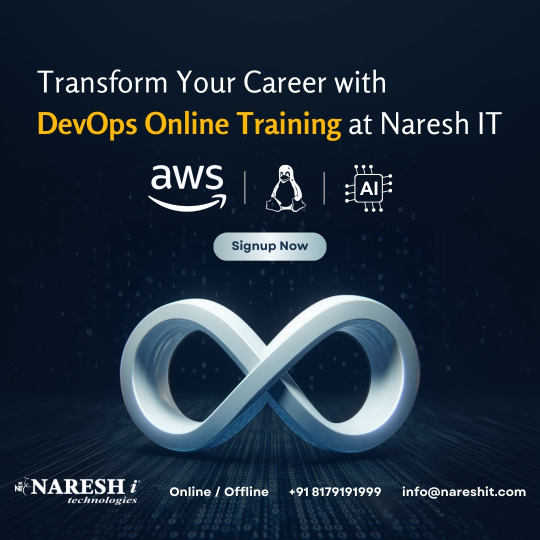
Boost your career with hands-on DevOps Online Training. Learn from industry experts and gain practical skills to become a DevOps pro. Enroll in our DevOps Online Training to get certified and accelerate your career!
#devops#DevOpsOnlineTraining#LearnDevOps#devops certification#DevOps Courses#DevOps Career#online training#devops engineer#devops tools#devops automation#DevOps Cloud#DevOps Best Practices#DevOps Hands-on Training#DevOps for Beginners
0 notes
Text
Master DevOps: Your Complete Guide and Roadmap | DevOps Online Training

Introduction to DevOps
In today's rapidly evolving technological landscape, the need for streamlined and efficient software development practices has never been greater. Enter DevOps—a culture, philosophy, and set of practices that bring development (Dev) and operations (Ops) together to improve collaboration, integration, and automation throughout the software development lifecycle. DevOps is not just a buzzword; it's a transformative approach that enables organizations to deliver high-quality software faster and more reliably. If you're looking to build a career in this field, DevOps Online Training is your gateway to mastering the skills required to excel in this domain.
What is DevOps?
DevOps is a combination of practices, tools, and cultural philosophies designed to increase an organization's ability to deliver applications and services at high velocity. By breaking down the traditional silos between development and operations teams, DevOps fosters a culture of collaboration, where both teams work together throughout the entire software development lifecycle. This collaboration leads to faster development, more frequent deployment of updates, and higher overall software quality.
At its core, DevOps emphasizes automation, continuous integration, continuous delivery (CI/CD), and monitoring. The goal is to minimize manual intervention, reduce errors, and improve the efficiency of software development and deployment. Through DevOps Online Training, you can learn how to implement these practices in real-world scenarios, making you an invaluable asset to any tech organization.
How DevOps Works
DevOps is built on a set of principles and practices that enable organizations to build, test, and deploy software rapidly and efficiently. Here's how DevOps works in practice:
1. Continuous Integration and Continuous Deployment (CI/CD)
Continuous Integration (CI) is the practice of merging code changes frequently, often multiple times a day, into a shared repository. Automated testing is then conducted to identify and resolve issues early in the development process. Continuous Deployment (CD) takes this a step further by automatically deploying code changes to production after passing the CI pipeline. Together, CI/CD reduces the time between writing code and delivering it to customers, ensuring that software updates are released frequently and reliably.
2. Automation
Automation is a critical component of DevOps. From building and testing code to deploying and monitoring applications, automation helps streamline the entire software development lifecycle. By automating repetitive tasks, teams can focus on more strategic activities, such as optimizing code and improving system performance. Automation tools like Jenkins, Ansible, and Puppet are commonly used in DevOps to create efficient, repeatable processes.
3. Infrastructure as Code (IaC)
Infrastructure as Code (IaC) is the practice of managing and provisioning computing infrastructure through machine-readable scripts rather than manual processes. This approach allows teams to automate the setup and configuration of environments, ensuring consistency across development, testing, and production stages. Tools like Terraform and AWS CloudFormation are popular choices for implementing IaC.
4. Monitoring and Logging
Effective monitoring and logging are essential to maintaining the health and performance of applications in a DevOps environment. By continuously monitoring systems and capturing logs, teams can identify and resolve issues before they impact end-users. Tools like Prometheus, Grafana, and ELK Stack are widely used for monitoring and logging in DevOps.
5. Collaboration and Communication
DevOps is as much about culture as it is about technology. A key aspect of DevOps is fostering a culture of collaboration and communication between development, operations, and other stakeholders. This collaboration ensures that everyone is aligned with the project's goals and that issues are addressed quickly. Tools like Slack, Microsoft Teams, and Jira facilitate communication and collaboration in a DevOps environment.
6. Security in DevOps (DevSecOps)
As security becomes increasingly important in software development, DevOps practices have evolved to include security as a core component. DevSecOps integrates security into every stage of the software development lifecycle, ensuring that security vulnerabilities are identified and addressed early in the process. By adopting DevSecOps practices, organizations can build more secure applications without compromising on speed and agility.
The Roadmap to Becoming a DevOps Engineer
Becoming a DevOps engineer requires a combination of technical skills, practical experience, and a deep understanding of DevOps principles. Here's a step-by-step roadmap to guide you on your journey:
1. Understand the Basics of DevOps
Before diving into specific tools and technologies, it's important to understand the fundamental principles of DevOps. Learn about the core concepts of CI/CD, automation, IaC, and monitoring. DevOps Online Training can provide you with a solid foundation in these areas, helping you grasp the essential elements of DevOps.
2. Gain Proficiency in Programming and Scripting
A strong foundation in programming and scripting is essential for a DevOps engineer. Start by learning a programming language like Python, Ruby, or Go, as well as scripting languages like Bash or PowerShell. These skills will enable you to automate tasks, write custom scripts, and work with various DevOps tools.
3. Master Version Control Systems
Version control systems (VCS) like Git are critical to DevOps practices. Learn how to use Git for version control, branching, and merging code. Understand how to collaborate with other developers using GitHub, GitLab, or Bitbucket. Version control is a fundamental skill that every DevOps engineer must possess.
4. Get Hands-On with CI/CD Tools
CI/CD is at the heart of DevOps, so gaining hands-on experience with CI/CD tools is crucial. Learn how to set up and configure Jenkins, CircleCI, or Travis CI to automate the build, test, and deployment processes. DevOps Online Training often includes practical labs and exercises that allow you to practice using these tools in real-world scenarios.
5. Learn About Infrastructure as Code (IaC)
IaC is a key practice in DevOps, enabling teams to manage and provision infrastructure programmatically. Familiarize yourself with IaC tools like Terraform, AWS CloudFormation, and Ansible. Learn how to write scripts that automate the creation and configuration of infrastructure, ensuring consistency across environments.
6. Develop Cloud Computing Skills
Cloud computing is an integral part of DevOps, as it provides the scalability and flexibility needed for modern software development. Gain proficiency in cloud platforms like AWS, Azure, or Google Cloud. Learn how to deploy applications to the cloud, manage cloud resources, and work with cloud-based DevOps tools.
7. Enhance Your Automation Skills
Automation is a cornerstone of DevOps, so it's essential to master automation tools and techniques. Learn how to automate tasks using tools like Jenkins, Puppet, and Chef. Understand how to create automated workflows that integrate with other DevOps tools and processes.
8. Learn About Monitoring and Logging
Effective monitoring and logging are crucial for maintaining the health of applications in a DevOps environment. Familiarize yourself with monitoring tools like Prometheus and Grafana, as well as logging tools like the ELK Stack. Learn how to set up monitoring dashboards, create alerts, and analyze logs to identify and resolve issues.
9. Embrace DevSecOps Practices
Security is a critical aspect of DevOps, and understanding DevSecOps practices is essential for a successful career in this field. Learn how to integrate security into the CI/CD pipeline, conduct security testing, and implement security best practices throughout the software development lifecycle.
10. Gain Practical Experience
Theory alone is not enough to become a proficient DevOps engineer. Hands-on experience is crucial. Work on real-world projects, contribute to open-source DevOps projects, or participate in internships. Practical experience will help you apply the skills you've learned and build a portfolio that showcases your expertise.
11. Obtain DevOps Certifications
Certifications can validate your skills and make you stand out in the job market. Consider obtaining certifications like AWS Certified DevOps Engineer, Google Cloud DevOps Engineer, or Microsoft Certified: Azure DevOps Engineer Expert. These certifications demonstrate your proficiency in DevOps practices and tools.
12. Stay Updated with Industry Trends
The field of DevOps is constantly evolving, with new tools and practices emerging regularly. Stay updated with industry trends by reading blogs, attending conferences, and participating in online communities. DevOps Online Training programs often include updates on the latest trends and tools in the industry.
13. Build a Strong Professional Network
Networking is important in any career, and DevOps is no exception. Join DevOps communities, attend meetups, and connect with other professionals in the field. Building a strong network can lead to job opportunities, collaborations, and valuable insights.
14. Prepare for DevOps Interviews
As you near the end of your learning journey, it's time to prepare for DevOps interviews. Practice common DevOps interview questions, participate in mock interviews, and review your projects and experiences. DevOps Online Training programs often include interview preparation sessions to help you succeed in landing your first DevOps job.
Conclusion
DevOps is a powerful approach that has revolutionized the way software is developed, tested, and deployed. By fostering collaboration between development and operations teams and leveraging automation, CI/CD, and cloud computing, DevOps enables organizations to deliver high-quality software at a rapid pace. Whether you're just starting your career or looking to transition into the field, DevOps Online Training can provide you with the skills and knowledge needed to succeed as a DevOps engineer.
By following the roadmap outlined in this article, you can develop the technical expertise, practical experience, and industry knowledge required to excel in DevOps. Remember to stay updated with the latest trends, build a strong network, and continuously improve your skills.
#devops#devopsonlinetraining#devops engineer#DevOps Roadmap#web development#development#software#Continuous Integration#Continuous Deployment#Cloud Computing#Automation#Software Development#IT Training#cicd#it training institute#it training courses#it training classes
0 notes
Text
Docker-Compose is an indispensable tool for managing multi-container Docker applications. With a simple YAML file, you can define, configure, and deploy all the services your application needs.
0 notes
Text
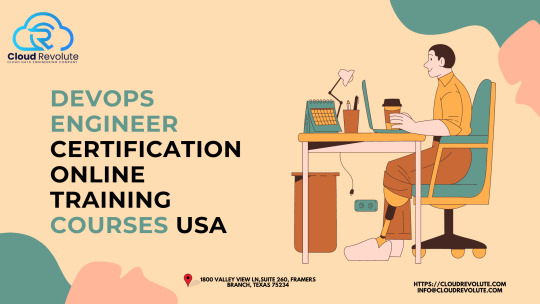
Best Devops Course Online USA-Cloud Revolute
0 notes
Text
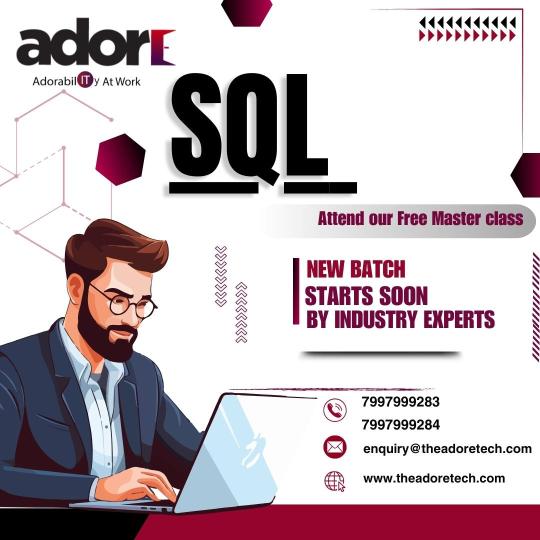
Adore Technologies,
"Unlock the power of data with our comprehensive SQL course! Join us on a journey to master Structured Query Language and delve into the world of efficient database management and analysis. Let's transform your career prospects together! #SQLMastery #DataDrivenFuture"
#digital illustration#devops#deep learning#data science#cybersecurity#power bi#ielts#gcp data engineer training in ameerpet#digital marketing#machinelearning#sqlserver#sql course#sqlexperts#educación#bachelors degree
1 note
·
View note
Text

Python courses in Aurangabad: Join for Python courses in Aurangabad offered by AVD Group to advance your coding knowledge and acquire the most recent programming methods. Our skilled instructors give you hands-on instruction using the most recent Python tools and methods to help you become an expert in Python. Our thorough curriculum gives you the knowledge you need to succeed in the industry, covering everything from basic Python ideas to advanced concepts. Join us now and enhance your programming skills with AVD Group's Python courses in Aurangabad.
0 notes